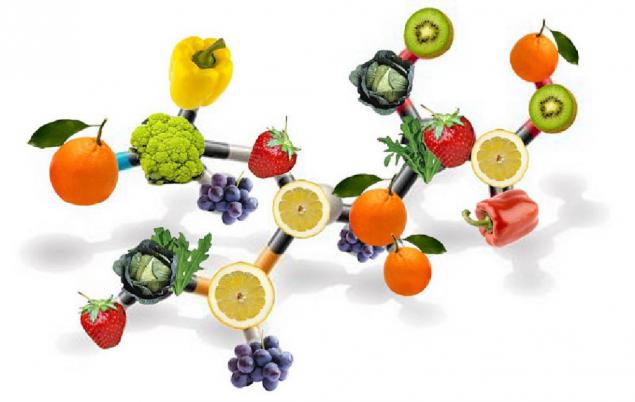883
"Your food should be your medicine." Hippocrates

American scientists claim that in twenty years, drugs are almost completely replaced by individualized therapeutic feeding
"Your food should be your medicine." Hippocrates, a physician, "the father of medicine»
"The doctor of the future will be to heal and prevent nutritional diseases." Thomas Edison, the great inventor and scientist
Nutrigenomics
Food and our genes
Throughout our lives we are exposed to a wide variety of food components. By complex biochemical processes of foods to extract useful elements, vitamins and energy. Thanks to this we are able to live and function. Modern scientific research has reliably confirmed that many food components affect the condition of our health. For example, the use of ready-made tomato sauces may help prevent prostate cancer due to their contained substances - lycopene.
A diet rich in fruits, vegetables, cereals and vegetable oils can prevent many diseases, common in humans.
Therefore, it is important to understand which products interact with our genes and affect them. The science that studies these processes is called nutrigenomics.
The essence of nutrigenomics is to define how our body reacts to certain foods, using a "systems biology."
Directions nutrigenomics
One of the areas of nutrigenomics is the development of new food products, taking into account the individual characteristics of the human body. Such projects are taken to finance the food producers. For example, the company Chr. Hansen (Denmark) is planning to introduce to the market new products that allow consumers to choose for themselves the most useful diet. But this idea is still only at the stage of development, the market of such products yet.
Deciphering the genetic one person, creating new useful products, development of individual diets based on DNA analysis - and all this in a unique science of nutrigenomics. Thanks to this science was able to establish that there is a close connection between the gene and the characteristics of a healthy diet.
And nutrigenomics does not change the genes, they remain the same, so the science is committed to be safe for humans or animals. Nutrigenomics retains the genes of human or animal in an unaltered state, it only affects the activity of a particular gene, resulting in the human body to a healthy and comfortable state.
With nutrigenomics can activate genes responsible for the activity of the immune system or, for example, to suspend the activity of the gene responsible for aging.
Application of modern science is quite wide, ranging from increasing the productivity of livestock activities and ending with improving the quality of human life.
Why nutrigenomics
Why do you need a diet developed based on DNA analysis? In an effort to achieve the ideal parameters, we do not think that each of us has a unique genetic code. Why is one unable to easily lose weight and the other does not help any diet, and some do not get fat.
Scientists have established that human reaction to food depends on its genotype. This pattern has been identified as a result of investigations of serious hereditary genetic diseases. For example, a mutation in the gene responsible for the synthesis of the hormone leptin leads to obesity. Some people are hard to digest milk products, as they have reduced lactose enzyme responsible for the breakdown of milk proteins.
Scientists have proved the genetic nature of the propensity to heart attacks, diabetes, cancer and other diseases of metabolism. Mutations that reduced or absent activity of certain genes lead to the disruption of the body's activities, and other unpleasant consequences.
Today there are many different theories and diets designed to help people fight obesity. Nutrigenomics, the newest and mysterious of them.
Testing the individual needs of the organism
To prevent mutation of genes need to know exactly what every body. Nutrigenomics is just engaged in the production of the right foods, taking into account the needs of a particular organism. Scientists, nutritionists have developed with the help of the test system, which matched the products necessary for a person. Then, of these products developed individual dietary course. At the same time the human diet should be balanced, as the deficiency or excess of any products negatively affects the condition of the body, and, consequently, on human health. For proper development of the organism, it is necessary to support both inside and outside.
In practice, DNA analysis is as follows: take a scraping from the mucous membrane on the inside of the cheek. The analysis of 19 genes that affect the functioning of internal organs. These data show the propensity of the organism to inflammatory and allergic reactions, digestibility antioxidants, insulin sensitivity and speed of the metabolic processes. With the help of a questionnaire determined individual preferences, habits, human and other important factors. Based on these studies a special computer program is personalized nutrition plan that includes foods permitted and prohibited products, plan of exercise and diet tips for a change.
Scientific opinion
Food Research Institute Dr. Sean Astley said that nutrigenomics science helps to identify and change the individual reactions to food components. Nutrigenomics is not just an expensive genetic testing and the development of individual diet. Many of this science helps to identify and eliminate such serious problems as the tendency to gain weight, or an allergic reaction to certain foods. Dr. Astley states that nutrigenomics will allow a person to be healthy even in old age.
American scientists claim that in twenty years, drugs are almost completely replaced by individualized therapeutic feeding. Nutrigenomics - a real chance to overcome the most difficult diseases are not medicines and the right way of life and an individual diet. If you only eat the right foods, you can not only lose weight but also improve your health, your body stay young, to overcome chronic ailments.
Deciphering the human genome allows us to treat and prevent many hereditary and acquired diseases. Scientists believe that for personalized diets our healthy future. This is a great opportunity to live more comfortably, have a slender body and perfect figure, long time to keep the youth of the body and get rid of many diseases.
Nutrigenomics and nutraceuticals
The words "nutrigenomics" and "nutraceutical" most of us seem to be hopelessly academic, unrelated to reality. In fact, they are already in many ways will determine our lives in the near future.
ERA NEW CONCEPTS
EXPERT
VLADIMIR Shakhtarin, Professor, MD, a geneticist
Chemical prose deeper and deeper into the gourmet part of our lives. This is the demand of time. For modern man breakfast, lunch or dinner - it is no longer a set of calories and nutrients micrograms - nutrient bioactive substances. Probably not all of them are known, but each knows his place in the human body, which should be actively integrated, it synthesizes something independent of it.
Each of the hundreds of nutrients prescribed human nature "works" on several genes. More precisely, it will organize the assimilation and reasonable use. "Nutrigenetika just studying the genes associated with the assimilation of certain nutrients - says Professor Vladimir Shakhtarin. - A nutrigenomics - a prospect to bring harmony to the food a specific person with his genome, a way of life, behavior, desires. You can ensure all possible human nutrients, but how they work, will be received and internalized, regulate genes. " The ideal physical (and mental) form - is primarily a perfect fit under your genotype internal biochemical balance
. DEAR NUTRIGENOM
Gene itself may not be good or bad. It is the article of the law, which stipulates how and what should be done in a particular organism with a particular nutrient.
For example, iron enters the body - a useful and necessary thing. The gene orders the form of special enzymes, which will bring the item to the desired state, and will distribute to all the needy cells. If the gene is active and operates at 100%, then these processes are implemented. But if the gene is active by 50%, or 20%, or 5% (and this is the polymorphisms, our individual characteristics), with the same intensity will be carried out and regulated processes them. That is, the iron in the diet and the blood might be enough, and the cells will not receive them. Previously, people could simply eat more and therefore gain more nutrients because they spent significantly more power (up to 3000-4000 calories a day), the modern man can not afford it.
Wide web
"Nutrigenetika did not come out of nowhere. Dietetics has created a huge springboard, detailed the content of nutrients in almost every food product - says Professor Shakhtarin. - Each bean is written: as its protein, carbohydrates and minerals. And if they are as clearly detailed knowledge of the genetic influence on the splitting and assimilation of these products, we have the knowledge compatible. »
nutritionists and nutrigenetikov Union is inevitable, he would like pattern and texture of fabric for each person, as the longitudinal and transverse threads. If by nutrigenetiki dismiss, the entire dietetics can be sent overboard. Today dry descriptions no longer enough, because all life has changed, and normalize the body to adapt to it will not succeed without nutrigenetiki.
"The so-called functional food becomes a mandatory part of the diet. This is not a fad. Similarly, the fitness of a good time for those wishing to become a pressing need. Without all this, we simply do not survive. »
These genes have been known TODAY
* Exchange and assimilation of vitamins A, C, D, E, B group and others.
* Assimilation of metals - iron, zinc, selenium, chromium and other
. * Fat digestion (among other things, indicate a predisposition to overweight, cholesterol).
* Exchange of carbohydrates (may indicate a predisposition to diabetes).
* Protein digestion (including gene lactase deficiency).
FAQ:
Nutrigenomics - the science of the impact of human nutrition (or other living creatures, such as animals) on gene expression
. It is often divided into two branches:
Actually nutrigenomics, which explores the effects of nutrients and their relation with the characteristics of genome expression, proteomics, metabolomics, and the resulting changes in the metabolism.
Nutrigenetika explores the effects of genetic variability in the effect of diet on health, with respect to data involving sensitive populations (eg, persons with diabetes, celiac disease, phenylketonuria, and so on. D.)
Nutrigenomics is not a well-formed branch of science, but its ultimate goal is declared the development of science-based personalized recommendations for optimal power on the basis of genetic information.
























